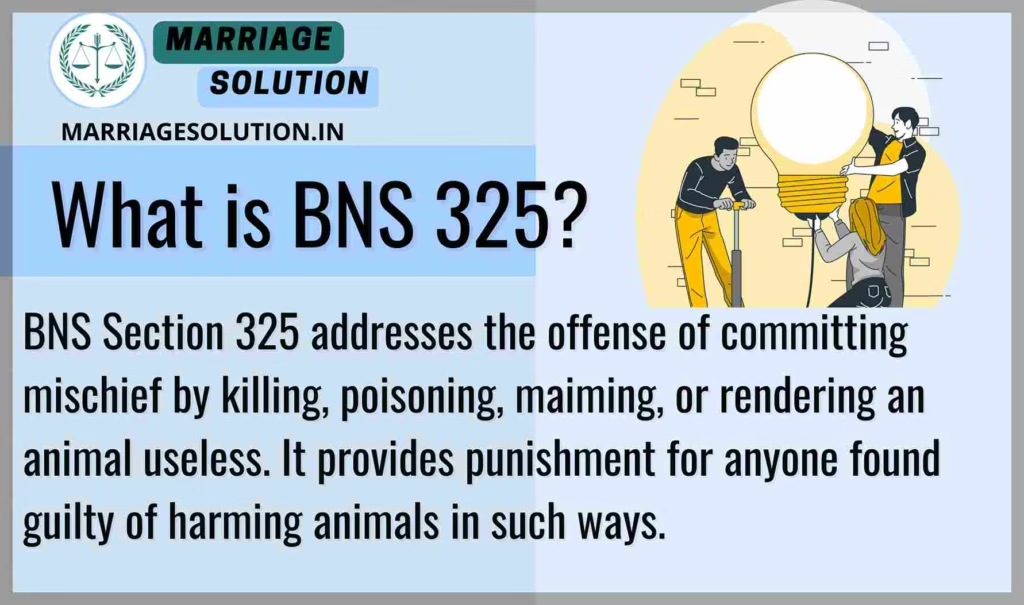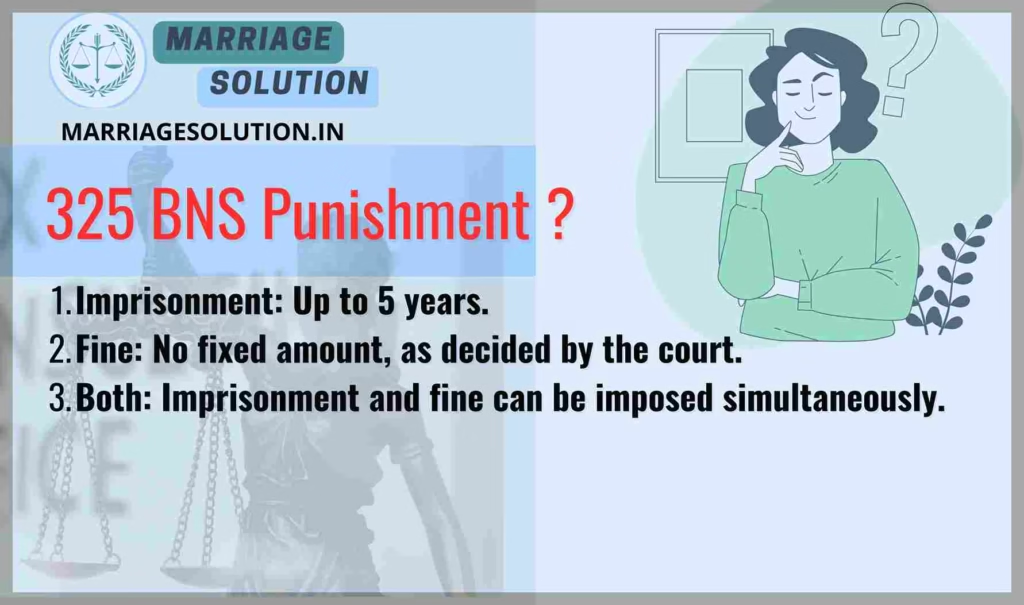Introduction of 325 BNS
325 BNS of the Bharatiya Nyaya Sanhita criminalizes mischief by killing, poisoning, maiming, or rendering an animal useless. It ensures protection of animals from cruelty by punishing those who intentionally or knowingly cause harm. This law applies to all animals — domestic, livestock, or wild — and highlights the importance of ethical treatment of living beings. By replacing IPC Sections 428 and 429, BNS 325 strengthens India’s legal framework against animal cruelty, promoting both animal welfare and public morality.
The Bharatiya Nyaya Sanhita (BNS) Section 325 replaces the old Indian Penal Code (IPC) Section 428 and 429.
What is BNS Section 325 ?
BNS Section 325 addresses the offense of committing mischief by killing, poisoning, maiming, or rendering an animal useless. It provides punishment for anyone found guilty of harming animals in such ways.

Under Section 325 of the bns act 2023
“Whoever commits mischief by killing, poisoning, maiming, or rendering useless any animal, shall be punished with imprisonment which may extend to five years, or with fine, or with both.”
1. Meaning of Mischief by Killing or Maiming Animals
- This section criminalizes intentional cruelty against animals.
- Acts like killing, poisoning, injuring, or making an animal permanently useless fall under this category.
- It applies whether the animal is domestic, wild, livestock, or used for work.
- Even harming one’s own animal (e.g., poisoning cattle to claim insurance) is punishable if done with wrongful intent.
2. Who is Covered?
This law applies to:
- Individuals → harming or killing pets, livestock, or stray animals.
- Owners → deliberately harming their own animals to cheat insurers or avoid liability.
- Public offenders → harming cattle, working animals, or wild animals affecting society at large.
- Repeat offenders → those who habitually engage in acts of animal cruelty.
3. Nature of the Offense
- Cognizable → Police can register a case and arrest without a warrant.
- Bailable → Accused can seek bail, but conditions may be applied by the court.
- Non-Compoundable → The case cannot be privately settled; it must go through trial.
- Triable by Magistrate of the First Class → A higher-level Magistrate handles these cases due to their seriousness.
4. Examples of BNS Section 325
- Example 1: A person deliberately poisons a neighbor’s cow, causing its death. → Punishable under this section.
- Example 2: A man intentionally breaks a horse’s leg so it can no longer work. → Considered maiming under this law.
- Example 3: A factory owner kills stray dogs by poisoning them to clear factory premises. → Covered under Section 325.
5. Punishment under BNS Section 325
- Imprisonment: Up to 5 years.
- Fine: Amount decided by the court.
- Both: Courts can impose both imprisonment and fine in serious cases.
6. Importance of BNS Section 325
- Protects animal welfare and discourages cruelty.
- Strengthens India’s stance on ethical treatment of animals.
- Prevents misuse of animals for fraud (e.g., killing insured cattle).
- Encourages compassion and accountability in society.
Section 325 BNS Overview
BNS Section 325 deals with the crime of committing mischief by killing, poisoning, maiming, or rendering an animal useless. It specifically addresses intentional actions that cause harm or death to animals. The law provides for imprisonment, a fine, or both as punishment for those who engage in such acts of cruelty.
BNS Section 325: Mischief by Killing or Maiming Animal
1. Definition of Mischief under BNS 325
BNS Section 325 clearly defines mischief as an act where a person kills, poisons, injures, or makes an animal useless. This includes any deliberate action taken with the purpose of causing harm or damage. The law treats animals as living beings whose protection is necessary, and any attempt to harm them intentionally is considered a punishable crime. For example, killing a cow, poisoning a pet dog, or breaking the leg of a horse falls under this section.
2. Types of Offenses Covered
This section is wide in scope because it covers several forms of cruelty to animals. It does not only focus on killing but also includes poisoning, maiming, or rendering the animal useless. Maiming means permanently damaging or disabling an animal, such as breaking its bones or blinding it. Even if the animal is not killed but is made unfit for its natural or useful purpose, the offense still applies.
3. Intent and Knowledge Requirement
For this offense to be proved, it must be shown that the person acted intentionally or had knowledge that their action would cause harm to the animal. Simply put, if a person deliberately injures an animal or knows their action will likely cause injury or death, they can be punished under this law. However, if harm happens by accident or due to negligence without intent, it will not fall under BNS 325.
4. Punishment for Mischief
The punishment under BNS Section 325 is strict to discourage cruelty against animals. An offender can be imprisoned for up to five years, fined, or face both penalties. The severity of the punishment depends on the seriousness of the harm caused. For example, poisoning an animal may lead to harsher punishment compared to minor injuries because of the higher cruelty involved.
5. Classification of the Offense
The offense of mischief by killing or maiming an animal is classified as cognizable and non-compoundable. Cognizable means police can register a case and arrest the accused without waiting for a court warrant. Non-compoundable means the case cannot be settled between the accused and the complainant outside court; only the legal process can decide the outcome.
6. Bail Status
Although the offense is serious, it is still bailable. This means that after being arrested, the accused has the right to apply for bail. Whether bail is granted or not depends on the court’s discretion. If the court feels the offense was intentional and severe, it may impose strict conditions or deny bail in some cases.
7. Impact on Public and Animal Welfare
This section is not just about punishing the offender but also about protecting society’s moral and ethical values. Animals are an important part of the community, whether as pets, livestock, or wild species. Protecting them from cruelty helps in maintaining compassion, preventing unnecessary suffering, and promoting overall public welfare.
8. Applicability to All Animals
One of the most important aspects of this law is that it applies to all animals. Whether it is a pet like a dog or cat, livestock like cows, goats, and horses, or even wild animals, the law covers every form of animal life. This ensures there is no loophole for cruelty under the excuse that the animal is not domesticated.
9. Jurisdiction and Trial
Cases under BNS Section 325 are handled by a Magistrate of the First Class. This gives the magistrate the power to carefully review the evidence, the seriousness of the injury, and then decide on the punishment. This ensures the matter is handled seriously and fairly within the judicial system.
10. Legal Recourse and Enforcement
Since the offense is cognizable, authorities can act quickly without waiting for long approvals. This empowers the police to register cases immediately when such cruelty is reported. It gives faster legal recourse to ensure animals are not left suffering while waiting for formalities. The legal system aims to ensure animals are protected, and offenders face timely punishment.
Examples of BNS Section 325:
- Example 1: A man intentionally poisons a dog to cause harm to the pet, knowing that it will result in the dog’s death. Under BNS Section 325, he has committed mischief by killing or maiming an animal, and he can be punished with imprisonment for up to five years, a fine, or both.
- Example 2: A person deliberately injures a horse by breaking its leg to prevent it from being used for work. This act of maiming the animal falls under BNS Section 325, and the offender can face imprisonment, a fine, or both.
325 BNS Punishment
- Imprisonment: Up to 5 years.
- Fine: No fixed amount, as decided by the court.
- Both: Imprisonment and fine can be imposed simultaneously.

325 BNS bailable or not ?
- Bailable: The accused can seek bail.
- Cognizable: The police can arrest without a warrant.
- Non-Compoundable: The case cannot be settled out of court.
Bharatiya Nyaya Sanhita Section 325
| Section | Offense | Punishment | Bailable / Non-Bailable | Cognizable / Non-Cognizable | Trial By |
|---|---|---|---|---|---|
| BNS Section 325 | Mischief by killing, poisoning, maiming or rendering useless any animal. | Imprisonment which may extend to 5 years, or fine, or both. | Bailable | Cognizable | Magistrate of the First Class |
| IPC Section 428 (Old) | Mischief by killing, poisoning, maiming or rendering useless any animal of the value of ten rupees or upwards. | Imprisonment which may extend to 2 years, or fine, or both. | Bailable | Cognizable | Any Magistrate |
| IPC Section 429 (Old) | Mischief by killing, poisoning, maiming or rendering useless any elephant, camel, horse, mule, buffalo, bull, cow or ox (whatever the value), or any other animal of the value of fifty rupees or upwards. | Imprisonment which may extend to 5 years, or fine, or both. | Bailable | Cognizable | Magistrate of the First Class |
BNS Section 325 FAQs
What does BNS Section 325 cover?
This section covers harm caused to animals, including killing, poisoning, maiming, or rendering them useless. It emphasizes intentional or knowing actions leading to such harm.
What is the punishment for harming animals under this BNS Section 325 ?
The punishment can include imprisonment for up to 5 years, a fine, or both, depending on the severity of the offense.
Can the offense under BNS Section 325 be compounded?
No, it is a non-compoundable offense, meaning it cannot be settled out of court and must go through judicial proceedings.
What types of animals are protected under BNS Section 325?
The section applies to all animals, whether wild, domestic, or livestock, ensuring comprehensive protection.
Who handles cases under BNS Section 325?
Such cases are triable by a Magistrate of the first class, ensuring that serious offenses receive appropriate judicial attention.
Conclusion
BNS Section 325 plays a crucial role in safeguarding animals from cruelty by criminalizing acts of intentional harm such as killing, poisoning, or maiming. With punishments extending up to five years of imprisonment, fines, or both, the law sends a strong message that animal cruelty will not be tolerated. Its cognizable and non-compoundable nature empowers authorities to take swift action, ensuring justice for animal welfare. By addressing these offenses, Section 325 not only protects animals but also upholds values of compassion and ethical responsibility in society.
Need Legal Support?
If you are dealing with court cases, marriage problems, or any other legal issue, our team at Marriage Solution – Lawyer Help is here for you. Simply fill out our quick online enquiry form, and we’ll connect you with the right legal expert to support your needs.
Finished with BNS 325 ? Continue exploring the next provisions of the Bharatiya Nyaya Sanhita (BNS), 2023. Each section includes explanations, examples, and plain-language breakdowns for easy understanding.
- 326 BNS : Mischief by injury, inundation, fire or explosive substance, etc.
- https://marriagesolution.in/bns_section/326-bns/
- 327 BNS : Mischief with intent to destroy or make unsafe a rail, aircraft, decked vessel or one of twenty tons burden.
- https://marriagesolution.in/bns_section/327-bns/
Of Criminal Trespass .
- 328 BNS : Punishment for intentionally running vessel aground or ashore with intent to commit theft, etc
- https://marriagesolution.in/bns_section/328-bns/
- 329 BNS : Criminal trespass and house-trespass.
- https://marriagesolution.in/bns_section/329-bns/
- 330 BNS : House-trespass and house-breaking.
- https://marriagesolution.in/bns_section/330-bns/
Full IPC Section List: https://marriagesolution.in/ipc-section-list
All Indian Law & Blogs: https://marriagesolution.in/indian-law/
Full BNSS Section List: https://marriagesolution.in/bnss_section-list
